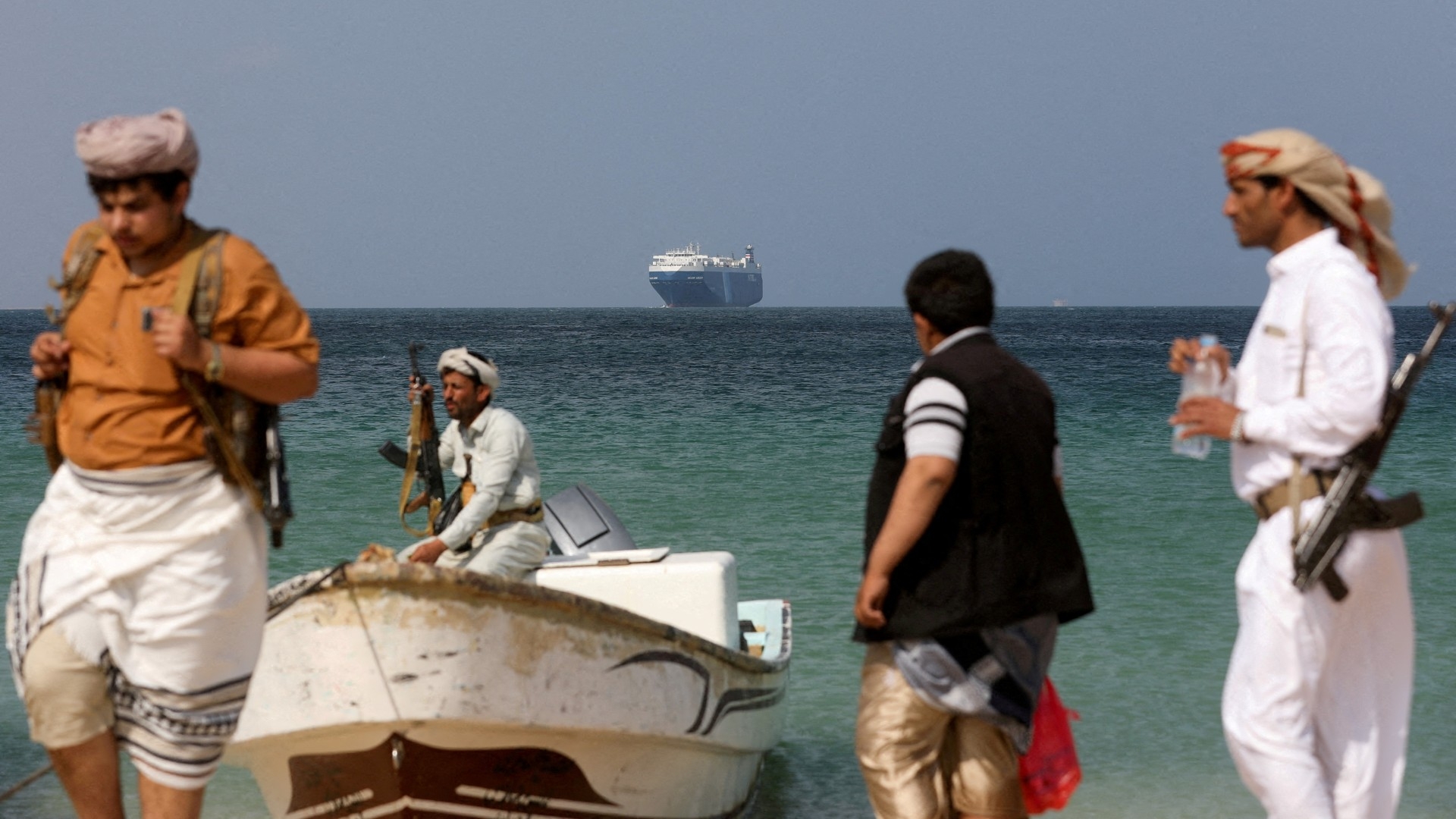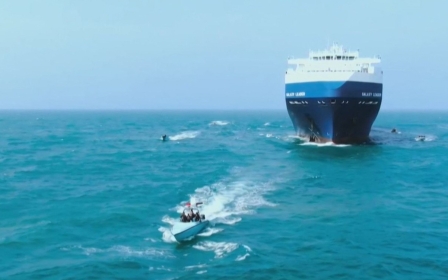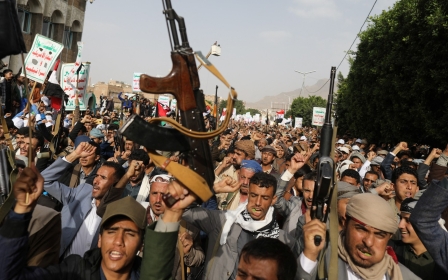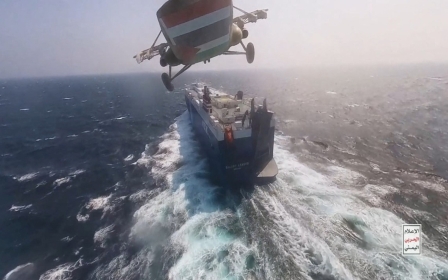War on Gaza: Why the oil market isn't freaking out about Houthi Red Sea attacks

The oil market is keeping relatively cool as Houthi ballistic missiles and drones sputter across the Red Sea, confounding some experts who expected a bigger jump in energy prices.
The US says Yemen's Houthis have launched more than 100 drone and missile attacks on 10 commercial vessels in the Red Sea. The attacks have intensified in recent days and oil prices have nudged up.
Brent Crude, the international benchmark, settled up about 0.6 percent on Wednesday to $79.70 a barrel, advancing weekly gains of about 8 percent.
Still, experts had expected more dramatic price swings given the history of oil prices rising when conflict erupts in the Gulf region.
The Houthi attacks have been concentrated around the Bab al-Mandab Strait, a strategic choke point in the Red Sea where about nine percent of global crude oil and petroleum products pass through.
New MEE newsletter: Jerusalem Dispatch
Sign up to get the latest insights and analysis on Israel-Palestine, alongside Turkey Unpacked and other MEE newsletters
"The risk premium in oil markets simply hasn’t been as elevated as one would have anticipated," Karen Young, an expert at Columbia University’s Center on Global Energy Policy, told Middle East Eye.
"Where is all the panic and wild price swings?" asked Viktor Katona, an analyst at commodities data firm Kpler.
"I think the market is massively downplaying the impact of a Bab-al Mandab disruption," Katona said.
He told MEE that the market appeared to be complacent about disruptions in the Red Sea, noting that the monthly average flow of seven million bpd (barrels per day) of crude and oil products through the Suez Canal to the strait's north was on track to be cut in half in December.
But oil market fundamentals, a rewiring of global energy flows, and strategic calculations among the Houthis and their backers in Tehran, may be keeping prices in check, experts say.
Goldman Sachs vs the Houthis
The Houthi attacks come as the oil market gushes with new supply, including in the US where production hit a new record. And tensions between Tehran and Washington over the war in Gaza haven’t dented Iran’s own soaring oil exports. Meanwhile, analysts are predicting weak oil demand.
“Energy passing through Bab al-Mandab is important to markets, but it’s not the whole story,” Jim Krane, an expert on energy studies at Rice University's Baker Institute, told MEE.
The Houthis - an Iran-backed group that captured Yemen’s capital Sanaa in 2014 and endured eight years of war against Saudi Arabia and its allies - hold a valuable chunk of real estate and Houthi officials have gleefully threatened to close the Bab al Mandab strait.
'The Houthis have been tremendously precise in not hitting non-western oil tankers'
- Viktor Katona, Kpler
At its narrowest point, the strait is just 18 miles wide, limiting tanker traffic to just two two-mile-wide channels for inbound and outbound vessels. Although it’s an important choke point, the artery that most worries markets and policymakers is the Strait of Hormuz separating Iran from Gulf states, where up to 30 percent of the world’s consumed oil passes.
Analysts at Goldman Sachs believe that if the Houthis were to follow through on their worse-case threat to close the strait, crude prices would rise just $3 or $4 per barrel.
Energy giant BP announced this week it would pause all shipments through the Red Sea, citing a “deteriorating security situation”. Norway-based oil tanker company Frontline also said it is diverting vessels on a longer journey around Africa.
Armen Azizian, a crude market analyst at Vortexa, told MEE that tankers near the Yemeni coastline have begun pinging different locations to mask their position as a safety measure. Freight rates for tanker vessels travelling from the Middle East to Europe have also risen as a result of the attacks.
Those actions underscore concern about the Houthi threat with vessel owners and operators carrying energy supplies, “[but] it is overall unlikely that flows will be rerouted in a significant and persistent way,” Azizian told MEE.
Russian and Saudi vessels safe
According to MarineTraffic data shared with MEE, on Tuesday evening there were 12 vessels carrying liquefied natural gas (LNG) in the Red Sea and 182 carrying liquid cargo, including oil and gas. That is greater than the average number of vessels carrying such cargo before the Houthis started their attacks.
Fotios Katsoulas, a lead analyst for tanker shipping at S&P, told MEE the companies that have diverted around Africa represent just a small portion of the global fleet.
One reason could be that a big chunk of tankers operating in the Red Sea are carrying Russian crude. Since the war in Ukraine, Arab Gulf states have traded places with Russia in the oil market, redirecting their sales to Europe, while Moscow diverts its oil shipments to Asia.
The global rewiring of the energy trade has boosted tanker traffic in the Red Sea, but few in the industry believe it will come in the Houthis’ crosshairs.
'The increased activity in terms of tankers passing through the Suez Canal since last year is primarily due to the Russian barrels... these vessels will not be targeted'
- Fotios Katsoulas, S&P
“The increased activity in terms of tankers passing through the Suez Canal since last year is primarily due to the Russian barrels switching away from Europe and heading for India and China,” Katsoulas said.
“All these vessels will simply not be targeted.”
The Houthis say they are only striking Israeli-linked vessels, but some with little or no ties to Israel have been hit.
On Monday, the Norwegian owner of a vessel attacked by the Houthis said the group had relied on incorrect industry trade data to attack its vessel over false links to Israel.
Still, industry insiders and western officials say the Houthis have shown a sophisticated ability to pinpoint their strikes.
“The Houthis have been tremendously precise in not hitting non-western oil tankers,” Katona, at Kpler, told MEE. “There are a lot of Saudi, Iraqi and Russian tankers in the Red Sea and the Houthis haven’t hit a single one.”
The Red Sea has seen a spike in vessels transporting LNG from Qatar to Europe as a result of the invasion of Ukraine, but few expect the Houthis to strike those vessels given Doha’s cordial relations with Iran.
The Houthis have also refrained from hitting Saudi or Emirati oil infrastructure. In their note, analysts at Goldman Sachs said the limited risk to production so far was another factor keeping a lid on prices.
'Gulf states intimidated'
On Tuesday, US National Security Council spokesman John Kirby said it was clear Iran was providing “the means, the tools, the capabilities [and] the weapons” to the Houthis to conduct the strikes, but sidestepped when asked whether Iran was directing them.
A western military official who spoke with MEE on condition of anonymity said the Houthis’ targeting practice - which ironically may be keeping oil markets tame - pointed to much closer coordination between the group’s leadership and Tehran.
'The Houthis and Iran have already won'
- Ali Alfoneh, Arab Gulf States Institute
“The Iranian Revolutionary Guard are in Yemen in force,” the official said. “The sophisticated Houthi targeting would indicate close guidance.”
The Houthis are now engaged in direct talks with Saudi Arabia to turn a pause in Yemen’s fighting into a long-term peace deal, one that analysts say is likely to solidify the Houthis' grip on northern Yemen.
“There is a lot of calculation by Iran and the Houthis here,” Ali Alfoneh, a senior fellow at the Arab Gulf States Institute, told MEE.
“They have no reason to strike Saudi oil tankers right now,” he said.

On Monday, the US announced a beefed-up naval task force, Operation Prosperity Guardian, to safeguard vessels in the Red Sea. Only one Arab nation publicly signed on: the kingdom of Bahrain.
The Houthis warned on Wednesday they would strike back if they were attacked by US forces and cautioned their Arab neighbours not to join the coalition.
Gulf states are reluctant to join the group out of concern it would appear they are siding with Israel at a time when their people are outraged over the war in Gaza.
And while Saudi Arabia is concerned about the Houthi strikes, Riyadh is likely taking solace in the fact that its assets haven't been hit, experts say.
"Iran and the Houthis have managed to intimidate their Arab neighbours. The Gulf states have everything to lose picking a fight with Iran and Iran has nothing to lose. The Houthis and Iran have already won," Alfoneh said.
Middle East Eye delivers independent and unrivalled coverage and analysis of the Middle East, North Africa and beyond. To learn more about republishing this content and the associated fees, please fill out this form. More about MEE can be found here.




